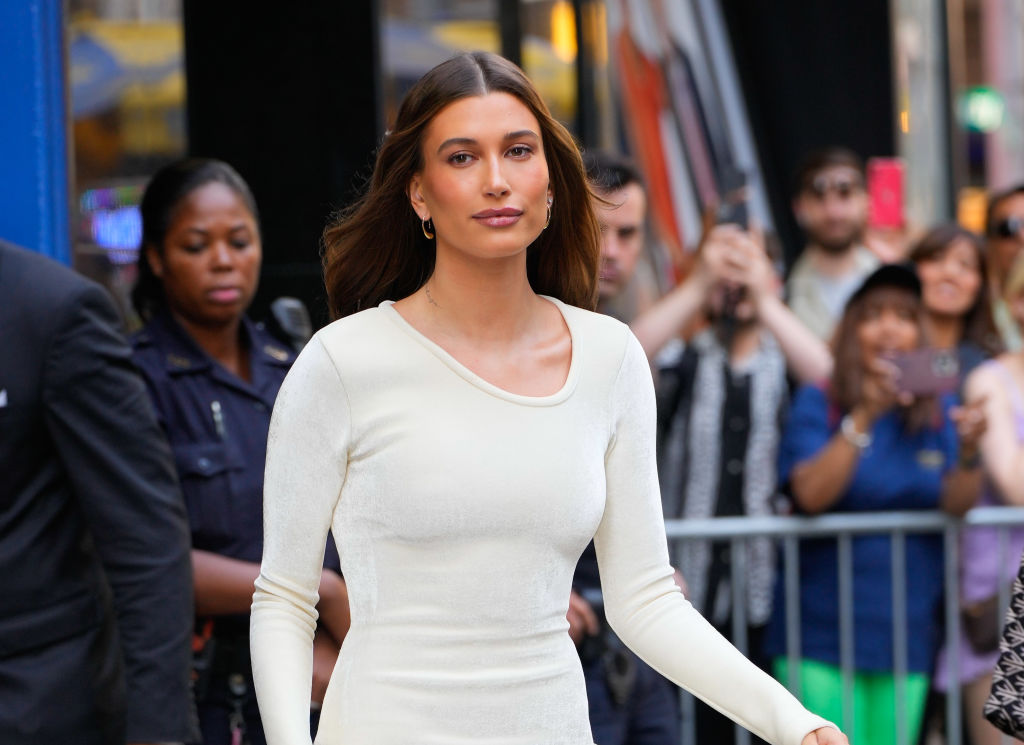
Hailey Bieber faced criticism over the weekend after a TikTok video she made about “brownie glazed lips” was called out for appropriating a makeup technique favored by Latinas and Black and brown women since the ’90s.
In Bieber’s original video, which has gained 2.9 million views since she posted it on Aug. 23, the model wears brown lip liner with a clear glossy lip treatment from her beauty brand Rhode, captioning the post “ready for all the fall things including brownie glazed lips.”
The use of brown lip liner and clear gloss has long been favored by women with darker skin tones, and Bieber doesn’t claim to have invented the lip combo in the video—but her post led to an influx of primarily white TikTok users recreating the look on the platform and crediting Bieber as their inspiration. As the trend took off, critics derided the framing of a beauty technique long practiced by women of color as having been “started” by a white celebrity. The controversy reached a boiling point over the weekend, when the topic began to trend on Twitter. One video in particular, in which creator Victoria Lyn referred to the beauty trend as “Hailey Bieber’s go-to fall lip combo,” was cited multiple times by other creators arguing that branding the technique “brownie glazed lips” is problematic and meant to help sell Bieber’s cosmetics.
Read more: Cornrows and Cultural Appropriation: The Truth About Racial Identity Theft
Twitter users underscored the longevity of the beauty trend and how it was popular with women of color long before Bieber posted about it; they also pointed out how the racism inherent in beauty ideals means that Bieber is being celebrated for doing the same thing that women of color have been criticized for.
Some of Bieber’s fans made the case that her mother is Brazilian and could have been the source of the model’s inspiration. But the look has historically been associated with the distinct aesthetics of cholas, a subculture of first and second generation Mexican Americans, as well as Black and brown women, who often turned to brown brow and eye liners and clear lip gloss to create a nude lip color when the market lacked shade options to match their skin tones.
The controversy surrounding Bieber’s “brownie glazed lips” is hardly new—it’s part of a larger conversation concerning cultural appropriation in beauty practices, especially when it comes to so-called trends that are popularized on platforms like TikTok and touted by influencers and celebrities. On TikTok, the most glaring example of this may be the “clean girl aesthetic,” which is characterized by slicked-back hair, gold hoops and other jewelry, minimalist makeup, and acrylic nails. These are all aesthetic elements that Latinas and Black women have long sported, now rebranded as “model off-duty” looks inspired by women like Bieber and Bella Hadid.
More from TIME
The implications extend far beyond TikTok. Though beauty standards are constantly shifting, the idealization of whiteness in beauty remains. Aesthetic trends practiced by women of color, like wearing braids, wigs, and elaborate acrylic nail art, have consistently been stigmatized until white women have tried them, suddenly making them cool or edgy. Kylie Jenner claimed she “started wigs,” and Kim Kardashian referred to her Fulani braids “Bo Derek braids.” The “brownie glazed lips” controversy shows how easily appropriation can happen and how, whether intentional or not, it comes at the expense of women of color. In a TikTok video posted on Friday, Latina creator @benulus said she regularly wears a dark liner and gloss combo in her videos and gets criticized for it, arguing that the appearances of white women are rarely scrutinized in the same way that those of women of color are.
“A white woman does it—it’s going to become a trend. It’s going to be praised,” she said in her video. “I’m so flattered that Hailey Bieber always gets inspired by my community, a POC community. But because she does it now, all the people that told me that these lips are ugly are exactly the ones that are going to fall behind that trend.”
More Must-Reads from TIME
- Cybersecurity Experts Are Sounding the Alarm on DOGE
- Meet the 2025 Women of the Year
- The Harsh Truth About Disability Inclusion
- Why Do More Young Adults Have Cancer?
- Colman Domingo Leads With Radical Love
- How to Get Better at Doing Things Alone
- Michelle Zauner Stares Down the Darkness
Write to Cady Lang at cady.lang@timemagazine.com